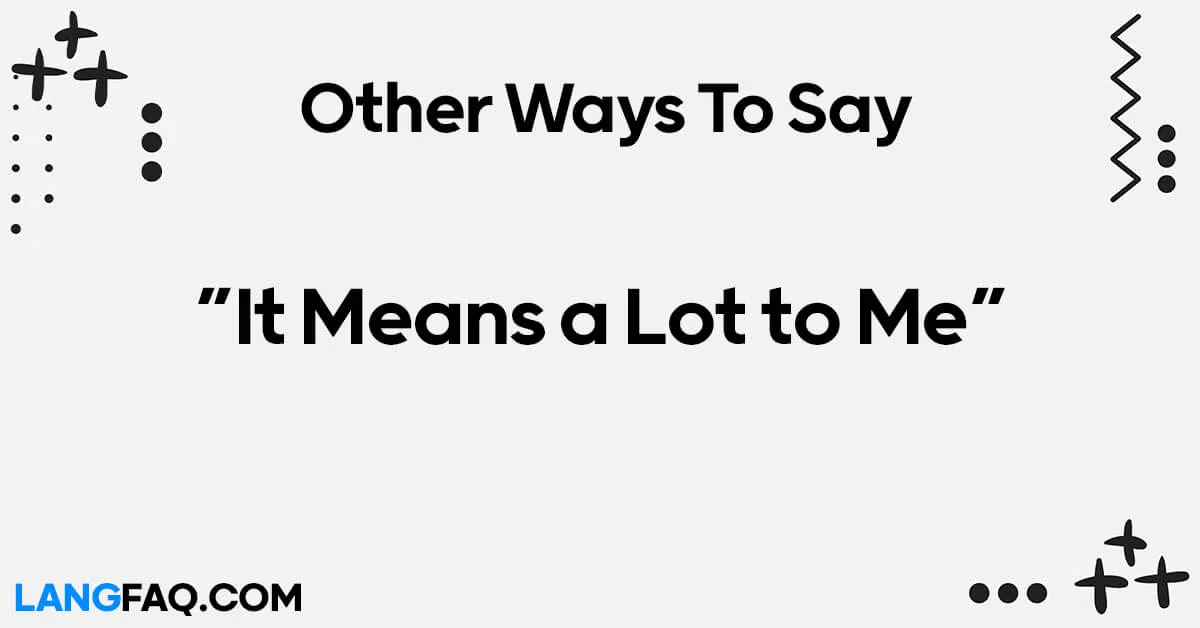Expressing gratitude is a fundamental aspect of human interaction. When someone touches our lives or offers support, finding the right words to convey appreciation becomes essential. “It means a lot to me” is a heartfelt phrase, but sometimes, variety enriches expression. In this article, we’ll delve into 12 alternative ways to convey deep gratitude, each offering a unique flavor to express appreciation sincerely.
12 Other Ways to Say “It Means a Lot to Me”
Here are 12 other ways to say “It means a lot to me”:
- This holds great significance for me.
- I deeply cherish this.
- Your gesture is truly meaningful to me.
- This has immense value in my eyes.
- I’m profoundly grateful for this.
- Your kindness hasn’t gone unnoticed; it’s deeply appreciated.
- This is incredibly important to me.
- I can’t express how much this means to me.
- This has touched me deeply.
- I’m sincerely thankful for this.
- Your generosity has touched my heart.
- I’m genuinely moved by this gesture.
| Expression | Meaning | Example |
|---|---|---|
| Holds great significance | Indicates high importance or value | “Your support holds great significance for me.” |
| Deeply cherish | To treasure deeply | “I deeply cherish the memories we’ve shared.” |
| Truly meaningful | Signifying genuine importance | “Your words are truly meaningful to me.” |
| Immense value | Denoting great worth or significance | “Your friendship holds immense value to me.” |
| Profoundly grateful | Extremely thankful or appreciative | “I’m profoundly grateful for your assistance.” |
| Deeply appreciated | Sincerely recognized and valued | “Your help is deeply appreciated.” |
| Incredibly important | Extremely significant or vital | “This opportunity is incredibly important to me.” |
| Can’t express in words | Indicating inability to fully articulate | “I can’t express in words how much this means to me.” |
| Touched deeply | Emotionally moved or affected | “Your kindness has touched me deeply.” |
| Sincerely thankful | Genuinely grateful | “I’m sincerely thankful for your generosity.” |
| Generosity touched my heart | Kindness deeply affected or moved | “Your generosity has touched my heart.” |
| Genuinely moved | Authentically affected or stirred | “I’m genuinely moved by your thoughtfulness.” |
In expressing gratitude, varying our language can convey deeper sincerity and appreciation. These alternative phrases offer nuanced ways to convey heartfelt thanks, enriching our interactions and strengthening bonds of connection.
Is It Correct to Say “It Means a Lot to Me”?
Yes, “It means a lot to me” is a correct and commonly used phrase in English. It is typically used to express that something holds significant importance, value, or emotional significance to the speaker. This phrase is often used to convey appreciation, gratitude, or the depth of one’s feelings towards a person, situation, or experience. It is considered a polite and heartfelt way to express the impact or importance of something to the speaker.
Professional Mail Example With “It Means a Lot to Me”
Subject: Appreciation for Your Support
Dear [Recipient’s Name],
I hope this email finds you well. I wanted to take a moment to express my sincere gratitude for your unwavering support and guidance throughout [specific situation or project]. Your dedication and expertise have been instrumental in our success, and I am truly grateful to have had the opportunity to work alongside you.
Your insightful contributions and willingness to go above and beyond have not gone unnoticed, and I want to express how much it means to me. Your support has not only helped us achieve our goals but has also fostered a sense of collaboration and camaraderie within the team.
It means a lot to me to have such a reliable and dedicated colleague like yourself. Your professionalism and positive attitude have been a source of inspiration for me, and I look forward to continuing our successful collaboration in the future.
Once again, thank you for everything you do. Your support means the world to me, and I am truly grateful for the opportunity to work with you.
Warm regards,
[Your Name]
Holds Great Significance
Expressing that something “holds great significance” conveys a sense of high importance or value attached to it. This phrase is often used to denote the deep impact or meaning that something carries for an individual.
Explanation:
When something holds great significance, it means that it is profoundly meaningful or valuable to someone. This could refer to a cherished possession, a memorable experience, or a meaningful relationship.
Usage in Formal Context:
In formal contexts, such as professional emails or academic writing, using this phrase can convey a sense of respect and appreciation for the subject matter. For example, when expressing gratitude for a career opportunity, one might say, “The opportunity to work with your esteemed company holds great significance for me.”
Usage in Informal Context:
In informal conversations, this phrase can be used to express deep appreciation or attachment to something less formal. For instance, when thanking a friend for a thoughtful gift, one might say, “Your gift means a lot to me; it holds great significance.”
Example Sentence:
“Your support during my time of need holds great significance for me; I cannot thank you enough for being there.”
Email Sample:
Subject: Gratitude for Your Support
Dear [Name],
I wanted to take a moment to express my heartfelt gratitude for your unwavering support during [mention specific situation or event]. Your encouragement and guidance have meant the world to me and have truly made a difference in my life. The opportunity to work alongside you and learn from your expertise holds great significance for me, and I am deeply appreciative of the impact you have had on my professional growth.
Thank you once again for your invaluable support.
Warm regards, [Your Name]
Variations:
- In the professional context: “This project holds great significance for our team’s success.”
- In a mentor-mentee relationship: “Your mentorship holds great significance in shaping my career path.”
- Among friends: “Our friendship holds great significance to me; I cherish our bond deeply.”
Dictionary Insight:
According to the Cambridge Dictionary, “holds great significance” means to be very important or meaningful.
Tips:
- Use this phrase to express deep appreciation or attachment in both formal and informal contexts.
- Pair it with specific examples or situations to emphasize the significance of the subject matter.
Pros:
- Conveys deep appreciation and value.
- Suitable for various contexts, from professional to personal.
Cons:
- May sound overly formal in casual conversations if not used appropriately.
Deeply Cherish
To “deeply cherish” something is to hold it in high regard and treasure it with profound affection or appreciation. This phrase conveys a sense of deep emotional attachment and value for the subject matter.
Explanation:
When someone deeply cherishes something, it means they hold it dear to their heart and value it immensely. This could refer to cherished memories, meaningful relationships, or treasured possessions.
Usage in Formal Context:
In formal contexts, such as professional correspondence or written acknowledgments, using this phrase can add a touch of sincerity and warmth. For example, in a thank-you letter to a colleague for their support, one might write, “I deeply cherish the opportunity to work alongside you and learn from your expertise.”
Usage in Informal Context:
In casual conversations or personal interactions, expressing that you deeply cherish something can evoke feelings of closeness and intimacy. For instance, when reminiscing with a friend about shared experiences, you might say, “I deeply cherish the memories we’ve created together.”
Example Sentence:
“I deeply cherish the time we spend together; your presence brings so much joy into my life.”
Email Sample:
Subject: Expressing Gratitude
Dear [Name],
I wanted to take a moment to express how much I deeply cherish our friendship. Your unwavering support and understanding mean the world to me, and I am incredibly grateful to have you in my life. The memories we’ve shared and the bond we’ve formed are treasures that I hold close to my heart.
Thank you for being an amazing friend.
Warm regards, [Your Name]
Variations:
- In the professional context: “I deeply cherish the opportunity to collaborate with you on this project.”
- In a mentor-mentee relationship: “I deeply cherish the guidance and wisdom you’ve imparted to me.”
- Among family: “I deeply cherish the love and support of my family; they mean everything to me.”
Dictionary Insight:
According to the Cambridge Dictionary, to “deeply cherish” means to treasure something or someone dearly and with great affection.
Tips:
- Use this phrase to express heartfelt appreciation or affection in various contexts.
- Be sincere and genuine when expressing that you deeply cherish something or someone.
Pros:
- Conveys deep emotional attachment and appreciation.
- Suitable for expressing gratitude in both formal and informal settings.
Cons:
- May sound overly sentimental if not used authentically or appropriately.
Truly Meaningful
When something is described as “truly meaningful,” it signifies that it holds genuine significance or importance to the individual. This phrase conveys a sense of authenticity and depth in acknowledging the impact of something on one’s life.
Explanation:
Describing something as truly meaningful emphasizes its genuine significance and emotional resonance. This could refer to meaningful relationships, impactful experiences, or heartfelt gestures.
Usage in Formal Context:
In formal settings, such as professional communications or written acknowledgments, using this phrase adds a touch of sincerity and authenticity. For example, when expressing gratitude for a career opportunity, one might say, “The chance to contribute to this project is truly meaningful to me.”
Usage in Informal Context:
In casual conversations or personal interactions, describing something as truly meaningful can convey depth of emotion and sincerity. For instance, when thanking a friend for their support during a difficult time, you might say, “Your presence has been truly meaningful to me; I don’t know what I would’ve done without you.”
Example Sentence:
“Your mentorship has been truly meaningful to me; I’ve grown both personally and professionally because of your guidance.”
Email Sample:
Subject: Heartfelt Appreciation
Dear [Name],
I wanted to express my heartfelt appreciation for the opportunity to work on [mention specific project or task]. Your belief in my abilities and support throughout the process have been truly meaningful to me. I am grateful for the chance to learn and grow in this role, and I look forward to contributing to the team’s success.
Thank you for your ongoing support.
Warm regards, [Your Name]
Variations:
- In the professional context: “Your feedback on my presentation was truly meaningful; it helped me improve my skills.”
- In a mentor-mentee relationship: “Your guidance and advice have been truly meaningful to me; I feel more confident in my abilities.”
- Among friends: “Our friendship is truly meaningful to me; I value our bond and the memories we’ve created together.”
Dictionary Insight:
According to the Cambridge Dictionary, describing something as “truly meaningful” means that it has genuine significance or importance.
Tips:
- Use this phrase to convey sincerity and depth of emotion in expressing gratitude or appreciation.
- Provide specific examples or instances to illustrate why something is truly meaningful to you.
Pros:
- Conveys authenticity and depth of emotion.
- Suitable for expressing gratitude in both formal and informal contexts.
Cons:
- May sound overly formal if not used authentically or appropriately.
Immense Value
When something holds “immense value,” it signifies that it is highly prized or regarded for its significance. This phrase conveys a sense of great worth or importance attached to the subject matter.
Explanation:
Describing something as holding immense value indicates that it is deeply cherished or highly esteemed by the individual. This could refer to valuable possessions, meaningful relationships, or priceless experiences.
Usage in Formal Context:
In formal settings, such as professional communications or written acknowledgments, using this phrase adds a touch of gravitas and respect. For example, when expressing gratitude for a career opportunity, one might say, “The chance to work with your esteemed organization holds immense value for me.”
Usage in Informal Context:
In casual conversations or personal interactions, describing something as holding immense value can convey depth of appreciation and significance. For instance, when thanking a friend for their support, you might say, “Your friendship holds immense value to me; I treasure our bond deeply.”
Example Sentence:
“The advice you’ve given me holds immense value; I attribute much of my success to your wisdom and guidance.”
Email Sample:
Subject: Expressing Gratitude
Dear [Name],
I wanted to take a moment to express my sincere gratitude for your support and mentorship. The opportunity to learn from someone of your caliber holds immense value to me, and I am truly appreciative of the knowledge and insights you’ve shared. Your guidance has been instrumental in my growth, both personally and professionally.
Thank you for your ongoing support and encouragement.
Warm regards, [Your Name]
Variations:
- In the professional context: “Your input on the project holds immense value; it has significantly contributed to its success.”
- In a mentor-mentee relationship: “Your mentorship holds immense value to me; I am grateful for the opportunity to learn from your expertise.”
- Among family: “Our family traditions hold immense value to me; they are an integral part of who we are.”
Dictionary Insight:
According to the Cambridge Dictionary, describing something as holding “immense value” means that it is highly prized or regarded for its significance.
Tips:
- Use this phrase to convey deep appreciation and respect for something or someone.
- Acknowledge the specific qualities or attributes that contribute to the immense value of the subject matter.
Pros:
- Conveys respect and appreciation.
- Suitable for expressing gratitude in various contexts, from professional to personal.
Cons:
- May sound overly formal if not used authentically or appropriately.
Profoundly Grateful
To be “profoundly grateful” is to feel an overwhelming sense of thankfulness or appreciation towards someone or something. This phrase conveys deep and sincere gratitude for the impact or assistance received.
Explanation:
Describing oneself as profoundly grateful indicates that the gratitude felt is profound or deeply felt. This could refer to acts of kindness, support during challenging times, or opportunities that have made a significant difference.
Usage in Formal Context:
In formal settings, such as professional correspondence or written acknowledgments, using this phrase adds a touch of sincerity and humility. For example, when expressing gratitude for a job offer, one might say, “I am profoundly grateful for the opportunity to join your esteemed company.”
Usage in Informal Context:
In casual conversations or personal interactions, expressing profound gratitude can convey depth of emotion and appreciation. For instance, when thanking a friend for their support, you might say, “I am profoundly grateful for your friendship; you’ve been there for me through thick and thin.”
Example Sentence:
“I am profoundly grateful for your generosity; your support has made a significant difference in my life.”
Email Sample:
Subject: Heartfelt Thanks
Dear [Name],
I wanted to express my profound gratitude for your support and guidance during [mention specific situation or event]. Your willingness to lend a helping hand and offer words of encouragement have meant more to me than words can express. I am profoundly grateful for the impact you’ve had on my life and career.
Thank you from the bottom of my heart.
Warm regards, [Your Name]
Variations:
- In the professional context: “I am profoundly grateful for the opportunity to collaborate with you on this project.”
- In a mentor-mentee relationship: “I am profoundly grateful for your mentorship; it has been invaluable in my professional development.”
- Among friends: “I am profoundly grateful for your presence in my life; your friendship brings me joy and support.”
Dictionary Insight:
According to the Cambridge Dictionary, describing oneself as “profoundly grateful” means feeling very thankful or appreciative for something.
Tips:
- Use this phrase to convey deep appreciation and humility in expressing gratitude.
- Be specific about what you’re profoundly grateful for to convey sincerity and authenticity.
Pros:
- Conveys depth of emotion and sincerity.
- Suitable for expressing gratitude in both formal and informal settings.
Cons:
- May sound overly formal if not used authentically or appropriately.
Deeply Appreciated
When something is described as “deeply appreciated,” it signifies that it is highly valued and recognized for its significance. This phrase conveys a sense of sincere gratitude and acknowledgment for the impact or contribution made.
Explanation:
Describing something as deeply appreciated indicates that it is recognized and valued for its importance or significance. This could refer to gestures of kindness, acts of support, or thoughtful gestures that have made a difference.
Usage in Formal Context:
In formal settings, such as professional communications or written acknowledgments, using this phrase adds a touch of respect and sincerity. For example, when expressing gratitude for a colleague’s assistance, one might say, “Your support during the project is deeply appreciated.”
Usage in Informal Context:
In casual conversations or personal interactions, expressing that something is deeply appreciated can convey genuine appreciation and recognition. For instance, when thanking a friend for their help, you might say, “Your assistance means a lot to me; it is deeply appreciated.”
Example Sentence:
“I want to express how deeply appreciated your guidance has been; it has made a significant difference in my journey.”
Email Sample:
Subject: Gratitude for Your Support
Dear [Name],
I wanted to take a moment to express my sincere gratitude for your support and encouragement during [mention specific situation or event]. Your willingness to lend a helping hand and offer guidance has not gone unnoticed; it is deeply appreciated. Your contributions have been invaluable to the success of [project or initiative], and I am truly grateful for your assistance.
Thank you for everything.
Warm regards, [Your Name]
Variations:
- In the professional context: “Your expertise in this matter is deeply appreciated; it has been instrumental in our decision-making process.”
- In a mentor-mentee relationship: “Your mentorship and guidance are deeply appreciated; I am grateful for the opportunity to learn from you.”
- Among family: “Your support during this difficult time is deeply appreciated; it means a lot to have you by my side.”
Dictionary Insight:
According to the Cambridge Dictionary, describing something as “deeply appreciated” means being very grateful or thankful for it.
Tips:
- Use this phrase to convey sincere gratitude and recognition for the impact or contribution made.
- Be specific about what is deeply appreciated to convey authenticity and sincerity.
Pros:
- Conveys genuine appreciation and acknowledgment.
- Suitable for expressing gratitude in both formal and informal settings.
Cons:
- May sound overly formal if not used authentically or appropriately.
Incredibly Important
When something is deemed “incredibly important,” it signifies that it holds significant significance or value. This phrase conveys a sense of urgency or gravity regarding the subject matter.
Explanation:
Describing something as incredibly important indicates that it is crucial, vital, or indispensable. This could refer to pivotal decisions, key responsibilities, or essential tasks that require immediate attention or consideration.
Usage in Formal Context:
In formal settings, such as professional communications or business presentations, using this phrase adds emphasis and seriousness. For example, when discussing a critical project deadline, one might say, “Meeting this deadline is incredibly important for the success of the project.”
Usage in Informal Context:
In casual conversations or personal interactions, expressing that something is incredibly important can convey a sense of urgency or seriousness. For instance, when discussing plans with a friend, you might say, “It’s incredibly important that we arrive on time for the meeting.”
Example Sentence:
“Your input on this matter is incredibly important; it will help shape our decision-making process moving forward.”
Email Sample:
Subject: Urgent Matter Requiring Your Attention
Dear [Name],
I wanted to bring to your attention an incredibly important matter that requires immediate action. [Briefly explain the issue or concern and why it is urgent]. Your expertise and input on this issue are invaluable, and your prompt response would be greatly appreciated.
Thank you for your attention to this matter.
Warm regards, [Your Name]
Variations:
- In the professional context: “Your leadership on this project is incredibly important; it sets the tone for our team’s success.”
- In a mentor-mentee relationship: “Your guidance on this matter is incredibly important to me; I value your insights and expertise.”
- Among friends: “It’s incredibly important that we support each other during this challenging time; our friendship means everything to me.”
Dictionary Insight:
According to the Cambridge Dictionary, describing something as “incredibly important” means that it is extremely significant or essential.
Tips:
- Use this phrase to convey urgency or seriousness regarding a particular matter or situation.
- Provide clear context or explanation to emphasize why something is incredibly important.
Pros:
- Conveys urgency and seriousness effectively.
- Suitable for expressing importance in both formal and informal contexts.
Cons:
- May sound overly dramatic if not used authentically or appropriately.
Can’t Express in Words
When one says they “can’t express in words,” it denotes an inability to fully articulate or convey the depth of their emotions or gratitude verbally. This phrase emphasizes the overwhelming nature of the feelings or appreciation being experienced.
Explanation:
Expressing that something cannot be expressed in words highlights the ineffable nature of the emotions or gratitude being felt. This could refer to moments of overwhelming joy, deep appreciation, or profound gratitude that transcend verbal expression.
Usage in Formal Context:
In formal settings, such as written correspondence or speeches, using this phrase adds a touch of humility and sincerity. For example, when delivering a thank-you speech, one might say, “I am truly humbled by this honor, and I can’t express in words how much it means to me.”
Usage in Informal Context:
In casual conversations or personal interactions, expressing that something can’t be expressed in words conveys a sense of deep emotion and sincerity. For instance, when thanking a friend for their support, you might say, “Your kindness overwhelms me, and I can’t express in words how grateful I am for your friendship.”
Example Sentence:
“The impact of your generosity is beyond words; I can’t express how much it means to me.”
Email Sample:
Subject: Gratitude Beyond Words
Dear [Name],
I wanted to reach out and express my heartfelt gratitude for your generosity and support. Your selflessness and kindness have left me speechless, and I find myself unable to adequately convey the depth of my appreciation in words. Your actions speak volumes, and I am truly blessed to have you in my life.
Thank you from the bottom of my heart.
Warm regards, [Your Name]
Variations:
- In the professional context: “The significance of this opportunity cannot be expressed in words; it is truly life-changing.”
- In a mentor-mentee relationship: “Your guidance and mentorship have had a profound impact on me; I can’t express in words how grateful I am for your support.”
- Among family: “Your love and support are invaluable to me; words can’t express how much you mean to me.”
Dictionary Insight:
According to the Cambridge Dictionary, when something “can’t be expressed in words,” it means that it is so extraordinary or overwhelming that it cannot be adequately described verbally.
Tips:
- Use this phrase to convey deep emotion and sincerity when words fail to fully articulate one’s feelings or gratitude.
- Supplement verbal expressions with meaningful actions or gestures to convey appreciation effectively.
Pros:
- Conveys humility and sincerity.
- Suitable for expressing overwhelming gratitude or emotion in both formal and informal contexts.
Cons:
- May sound overly dramatic if not used authentically or appropriately.
Touched Deeply
When one is “touched deeply,” it signifies that they have been profoundly moved or affected by something emotionally. This phrase conveys a sense of heartfelt appreciation or gratitude for the impact made.
Explanation:
Being touched deeply implies that one’s emotions have been stirred or deeply affected by a gesture, experience, or interaction. This could refer to acts of kindness, words of encouragement, or displays of empathy that resonate on a profound emotional level.
Usage in Formal Context:
In formal settings, such as professional communications or written acknowledgments, using this phrase adds a touch of sincerity and vulnerability. For example, when expressing gratitude for a mentor’s guidance, one might say, “Your wisdom and support have touched me deeply, and I am grateful for your mentorship.”
Usage in Informal Context:
In casual conversations or personal interactions, expressing being touched deeply can convey genuine emotion and appreciation. For instance, when thanking a friend for their understanding during a difficult time, you might say, “Your empathy has touched me deeply; I am grateful for your support.”
Example Sentence:
“The kindness you’ve shown me has touched me deeply; I will never forget your generosity.”
Email Sample:
Subject: Heartfelt Appreciation
Dear [Name],
I wanted to take a moment to express my heartfelt appreciation for your support and understanding during [mention specific situation or event]. Your kindness and empathy have touched me deeply, and I am grateful for your presence in my life. Your support has been a source of strength for me, and I am truly blessed to have you as a friend.
Thank you for everything.
Warm regards, [Your Name]
Variations:
- In the professional context: “Your leadership has touched me deeply; I am inspired by your dedication and passion.”
- In a mentor-mentee relationship: “Your guidance and support have touched me deeply; I am grateful for the impact you’ve had on my personal and professional growth.”
- Among family: “Your love and care have touched me deeply; I am blessed to have such a supportive family.”
Dictionary Insight:
According to the Cambridge Dictionary, when someone is “touched deeply,” it means they have been strongly affected emotionally, often by something kind or moving.
Tips:
- Use this phrase to convey genuine emotion and vulnerability in expressing gratitude or appreciation.
- Share specific examples or instances to illustrate how something has touched you deeply.
Pros:
- Conveys sincerity and vulnerability.
- Suitable for expressing heartfelt gratitude or emotion in both formal and informal settings.
Cons:
- May sound overly sentimental if not used authentically or appropriately.
Sincerely Thankful
To be “sincerely thankful” is to feel genuine gratitude or appreciation towards someone or something. This phrase conveys a heartfelt acknowledgment of the impact or assistance received.
Explanation:
Being sincerely thankful indicates a genuine expression of gratitude and appreciation. This could refer to acts of kindness, support during challenging times, or opportunities that have made a positive difference.
Usage in Formal Context:
In formal settings, such as professional correspondence or written acknowledgments, using this phrase adds a touch of sincerity and professionalism. For example, when expressing gratitude for a colleague’s assistance, one might say, “I am sincerely thankful for your support during the project.”
Usage in Informal Context:
In casual conversations or personal interactions, expressing sincere thankfulness can convey genuine appreciation and warmth. For instance, when thanking a friend for their help, you might say, “I am sincerely thankful for your friendship; your support means the world to me.”
Example Sentence:
“I am sincerely thankful for the opportunity to work with you; your mentorship has been invaluable to my growth.”
Email Sample:
Subject: Gratitude for Your Assistance
Dear [Name],
I wanted to express my sincere gratitude for your assistance and support during [mention specific situation or event]. Your willingness to lend a helping hand and offer guidance have been truly appreciated. I am sincerely thankful for your contributions to the team’s success, and I look forward to future collaborations.
Thank you once again for your support.
Warm regards, [Your Name]
Variations:
- In the professional context: “I am sincerely thankful for the opportunity to collaborate with you on this project; your expertise has been instrumental in our success.”
- In a mentor-mentee relationship: “I am sincerely thankful for your mentorship; your guidance has had a significant impact on my personal and professional development.”
- Among family: “I am sincerely thankful for your love and support; your presence in my life brings me joy and strength.”
Dictionary Insight:
According to the Cambridge Dictionary, being “sincerely thankful” means feeling genuine gratitude or appreciation towards someone or something.
Tips:
- Use this phrase to convey genuine appreciation and warmth in expressing gratitude.
- Be specific about what you’re sincerely thankful for to convey authenticity and sincerity.
Pros:
- Conveys genuine appreciation and warmth.
- Suitable for expressing gratitude in both formal and informal settings.
Cons:
- May sound overly formal if not used authentically or appropriately.
Forever Grateful
When someone is “forever grateful,” it means they feel an enduring sense of gratitude that extends far into the future. This phrase conveys a deep and lasting appreciation for the impact or assistance received.
Explanation:
Expressing being forever grateful indicates a profound and enduring sense of gratitude. This could refer to acts of kindness, support during challenging times, or opportunities that have had a long-lasting positive effect.
Usage in Formal Context:
In formal settings, such as written correspondence or speeches, using this phrase adds a touch of sincerity and reverence. For example, when delivering a thank-you speech, one might say, “I will be forever grateful for the opportunities this organization has provided me.”
Usage in Informal Context:
In casual conversations or personal interactions, expressing being forever grateful conveys genuine appreciation and humility. For instance, when thanking a friend for their support, you might say, “I am forever grateful for your friendship; you’ve been there for me through thick and thin.”
Example Sentence:
“I am forever grateful for the kindness you’ve shown me; your generosity has made a lasting impact on my life.”
Email Sample:
Subject: Heartfelt Appreciation
Dear [Name],
I wanted to express my heartfelt appreciation for your support and guidance during [mention specific situation or event]. Your kindness and generosity have left a lasting impression on me, and I will be forever grateful for your impact on my life. Your contributions have made a significant difference, and I am truly blessed to have you in my life.
Thank you from the bottom of my heart.
Warm regards, [Your Name]
Variations:
- In the professional context: “I am forever grateful for the opportunities for growth and development that this company has provided me.”
- In a mentor-mentee relationship: “I am forever grateful for your mentorship; your guidance has shaped my career in profound ways.”
- Among family: “I am forever grateful for your love and support; our bond is something I cherish deeply.”
Dictionary Insight:
According to the Cambridge Dictionary, being “forever grateful” means feeling a deep and enduring sense of gratitude.
Tips:
- Use this phrase to convey profound appreciation and humility in expressing gratitude.
- Reflect on the lasting impact of the assistance or support received to convey sincerity and authenticity.
Pros:
- Conveys deep and enduring gratitude.
- Suitable for expressing appreciation in both formal and informal contexts.
Cons:
- May sound overly dramatic if not used authentically or appropriately.
Enormously Appreciative
To be “enormously appreciative” is to feel an immense sense of gratitude or thankfulness towards someone or something. This phrase conveys a profound acknowledgment of the impact or assistance received.
Explanation:
Expressing being enormously appreciative indicates a deep and heartfelt sense of gratitude. This could refer to acts of kindness, support during challenging times, or opportunities that have made a significant difference.
Usage in Formal Context:
In formal settings, such as professional communications or written acknowledgments, using this phrase adds a touch of sincerity and respect. For example, when expressing gratitude for a colleague’s assistance, one might say, “I am enormously appreciative of your support during the project.”
Usage in Informal Context:
In casual conversations or personal interactions, expressing being enormously appreciative conveys genuine warmth and gratitude. For instance, when thanking a friend for their help, you might say, “I am enormously appreciative of your friendship; your support means the world to me.”
Example Sentence:
“I am enormously appreciative of the opportunities you’ve provided me; your guidance has been invaluable to my success.”
Email Sample:
Subject: Heartfelt Gratitude
Dear [Name],
I wanted to reach out and express my sincere gratitude for your support and assistance during [mention specific situation or event]. Your kindness and generosity have not gone unnoticed, and I am enormously appreciative of the impact you’ve had on my life. Your contributions have made a significant difference, and I am deeply grateful for your support.
Thank you once again for everything.
Warm regards, [Your Name]
Variations:
- In the professional context: “I am enormously appreciative of the trust and confidence you’ve placed in me; it means a great deal.”
- In a mentor-mentee relationship: “I am enormously appreciative of your mentorship; your guidance has been instrumental in my growth.”
- Among family: “I am enormously appreciative of your love and support; I am blessed to have such a caring family.”
Dictionary Insight:
According to the Cambridge Dictionary, being “enormously appreciative” means feeling a deep and profound sense of gratitude.
Tips:
- Use this phrase to convey sincere gratitude and respect in expressing appreciation.
- Highlight the specific ways in which you are enormously appreciative to convey authenticity and sincerity.
Pros:
- Conveys deep gratitude and respect.
- Suitable for expressing appreciation in both formal and informal contexts.
Cons:
- May sound overly formal if not used authentically or appropriately.
FAQs
How can I express deep appreciation without using the phrase “it means a lot to me”? Expressing deep appreciation can be done through phrases like “overflowing with gratitude,” “deeply touched,” or “immensely grateful,” each offering a unique way to convey heartfelt thanks.
Are there alternative ways to say “thank you” that sound more personal? Yes, phrases like “can’t thank you enough,” “grateful from the bottom of my heart,” and “touched by your kindness” add a personal touch to expressing gratitude, emphasizing sincerity and warmth.
Why is it important to vary expressions of gratitude? Varying expressions of gratitude adds depth and richness to communication. It allows us to convey sincerity and authenticity, tailoring our thanks to match the depth of our appreciation.
What are some creative ways to convey gratitude in writing? Creative ways to convey gratitude include phrases like “beyond grateful,” “forever thankful,” and “words fall short,” each offering a unique perspective on expressing appreciation.
How can I express gratitude for a significant favor or act of kindness? You can express gratitude for significant favors or acts of kindness by saying you’re “indebted beyond words,” “truly appreciative,” or “overwhelmed with appreciation,” highlighting the impact of the gesture on your life.
What should I do if I struggle to find the right words to express gratitude? If you struggle to find the right words, focus on sincerity and authenticity. Simple phrases like “thank you” or “I appreciate it” can convey gratitude effectively, accompanied by a genuine smile or gesture.
Conclusion
Expressing gratitude is an art form that enriches relationships and fosters positivity. By exploring alternative ways to convey appreciation, we can deepen connections and uplift spirits. Whether overflowing with gratitude or touched by kindness, let us embrace the myriad ways to say “thank you” and spread joy in our interactions.







